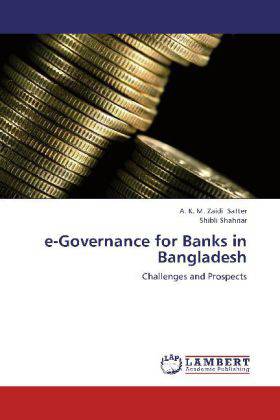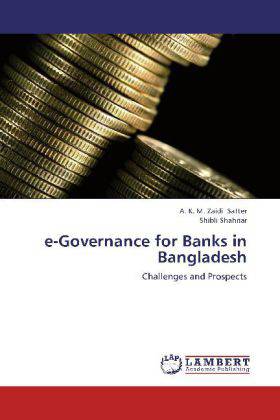
- Afhalen na 1 uur in een winkel met voorraad
- Gratis thuislevering in België vanaf € 30
- Ruim aanbod met 7 miljoen producten
- Afhalen na 1 uur in een winkel met voorraad
- Gratis thuislevering in België vanaf € 30
- Ruim aanbod met 7 miljoen producten
Zoeken
e-Governance for Banks in Bangladesh
Challenges and Prospects
A. K. M. Zaidi Satter, Shibli Shahriar
Paperback | Engels
€ 61,95
+ 123 punten
Omschrijving
With the onset of information revolution, many developing countries have looked at Information Technology (IT) as a possible new tool to solve age-old problems of poverty, bad governance, and sluggish economic growth. While the developed countries have been able to benefit greatly from the wide use of IT, many developing countries are still grasping to make sense of how IT fits into their problems.The trend is true in the case of e-Governance also. In Bangladesh, e-Governance has been talked about a lot, some government offices and banks have even taken innovative steps towards certain e-Government projects. Since this is a new concept for government officials who are used to familiar methods of work, the growth of e-Governance is met with resistance and fear, among other infrastructural problems. This research monograph is a little attempt from the authors on the concept of e-Governance and its application for the banks in Bangladesh. It also focuses on the challenges and prospects of e-governance for the banks in Bangladesh.
Specificaties
Betrokkenen
- Auteur(s):
- Uitgeverij:
Inhoud
- Aantal bladzijden:
- 84
- Taal:
- Engels
Eigenschappen
- Productcode (EAN):
- 9783659230769
- Verschijningsdatum:
- 5/09/2012
- Uitvoering:
- Paperback
- Afmetingen:
- 152 mm x 220 mm
- Gewicht:
- 136 g

Alleen bij Standaard Boekhandel
+ 123 punten op je klantenkaart van Standaard Boekhandel
Beoordelingen
We publiceren alleen reviews die voldoen aan de voorwaarden voor reviews. Bekijk onze voorwaarden voor reviews.







